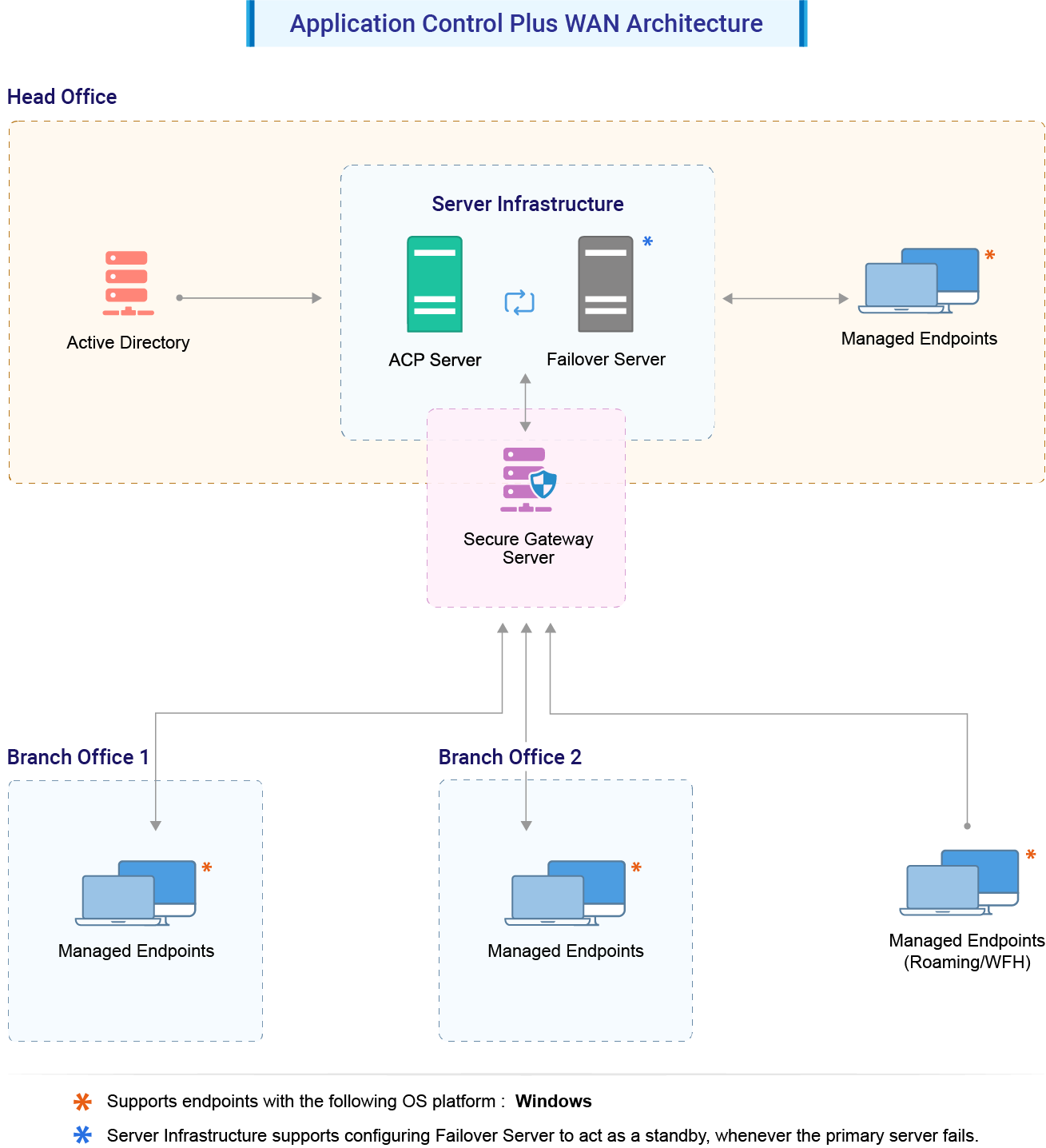WAN Architecture
ManageEngine Application Control Plus is an enterprise application control software that helps to create application allowlists and blocklists by specifying a set of rules. Inbuilt with the ability to exercise its functionalities at various levels of flexibility, Application Control Plus can fit the unique requirements of any kind of enterprise. Application Control Plus supports the application control process even in a distributed setup like branch or remote offices (WAN) and for mobile users, for example sales persons who are constantly on the move.
Advantages
The advantages of using the WAN architecture of Application Control Plus include the following:
- Affordable, simple and quick solution for an enterprises application control requirements
- Utilizes low bandwidth
- Utilizes the same infrastructure for VPN connections. No separate VPN infrastructure is required
- Ensures that communication between the server and agents is secured
- Controls applications for users in local offices, remote offices and for those who are always on the go, centrally using a single Web console
The following guide will help you understand the process of application control with the help of an architecture diagram.

IT administrators or network security teams need the following components to perform application control in the remote computers:
Components
Application Control Plus Server:
The Application Control Plus Server helps you to centrally perform all the application control tasks in your network endpoints. Some of the tasks include the following:
- Installing agents in computers.
- Scanning computers to discover the running applications.
- Deploying policies to associate application allowlists/blocklists to specific groups of computers.
Any of the Windows computers in your network with the requirements mentioned here can be hosted as your Application Control Plus Server.
| Port | Purpose | Type | Connection |
|---|---|---|---|
| 8020 | Agent Server communication | HTTP | Inbound to server |
| 8027 | Agent Server communication | TCP | Inbound to server |
| 8383 | For communication between the agent and the Application Control Plus Server | HTTPS | Inbound to server |
| Port | Purpose | Type | Connection |
|---|---|---|---|
| 636 | LDAP over SSL | TCP | Outbound from Server |
| 389 | LDAP | TCP, UDP | Outbound from Server |
Note: Ports 135,139 and 445 should also be kept open and inbound on both agent and server (and distribution server, if applicable) for pushing agent installation.
Application Control Plus Server has to be installed in your LAN (say, the head office) and has to be configured as an EDGE device. This means that the designated port (default being 8020 and is configurable) should be accessible through the Internet. You need to adopt necessary security standards to harden the OS where the Application Control Plus Server is installed. Agents from all the remote locations report to this Application Control Plus Server.
The Server acts as a container to store information about the discovered applications and the policies deployed. It is advised to keep the Application Control Plus Server always running to carry out the day-to-day Application Control activities.
- Low bandwidth utilization as only one agent will contact the Server periodically
- Pulls the details of the policies deployed specific to machines in the remote office, from the Application Control Plus Server and makes it available for the rest of the computers in the branch
- Supports secured mode of communication (SSL/HTTPS) with the Server
Agents:
To perform application control, a lightweight, multipurpose agent will be installed by the server in your network systems. The agent contacts the server every 90 minutes to get the data needed to carry out the tasks delegated by the server. It returns back the result to the server after completion of the task. The agent also maintains a continuous thin connection with the server in order to perform on-demand tasks.
Agents can be installed either manually or using a logon script in all the branch-office computers that are being managed using Application Control Plus. This task is a one-time task. Up-gradation of agents is done automatically. Application Control offers two options to help administrators manage computers across a WAN. The option that you choose depends on the number of computers you are going to manage at your remote office. The options available, enable you to use either of the following:
- Distribution servers and WAN agents: It is recommended that you use this option if you are managing more than 10 computers in a remote office.
- WAN agents only: It is recommended that you use this option if you are managing less than 10 computers in a remote office.
Web console:
The web console is a graphical user interface to access the server and perform application control tasks. This console can be accessed from anywhere. For example, it can be accessed through a LAN, WAN, and from home using the Internet or a VPN. Separate client installations are not required to access the Web console.
Securing WAN agents and server communication
To secure the WAN network managed by Endpoint Central follow the below recommendations:
- Enable secured roaming agents (WAN agents) - server communication while creating remote office by going to Admin-> Scope of Management -> Remote Offices -> Add/ Modify Remote office -> Communication Details -> Enable Secured Communications (HTTPS)
- For secure remote control connection, enable secure communication for web socket and file transfer port by going to Tools --> Remote Control --> Settings --> Port Settings --> Enable Use secure connection.
- Secure communications of mobile/roaming users using Secure Gateway. Refer this document for more details.
- Configure same FQDN for LAN and WAN agents to minimize bandwidth consumption. Refer this document for more details.